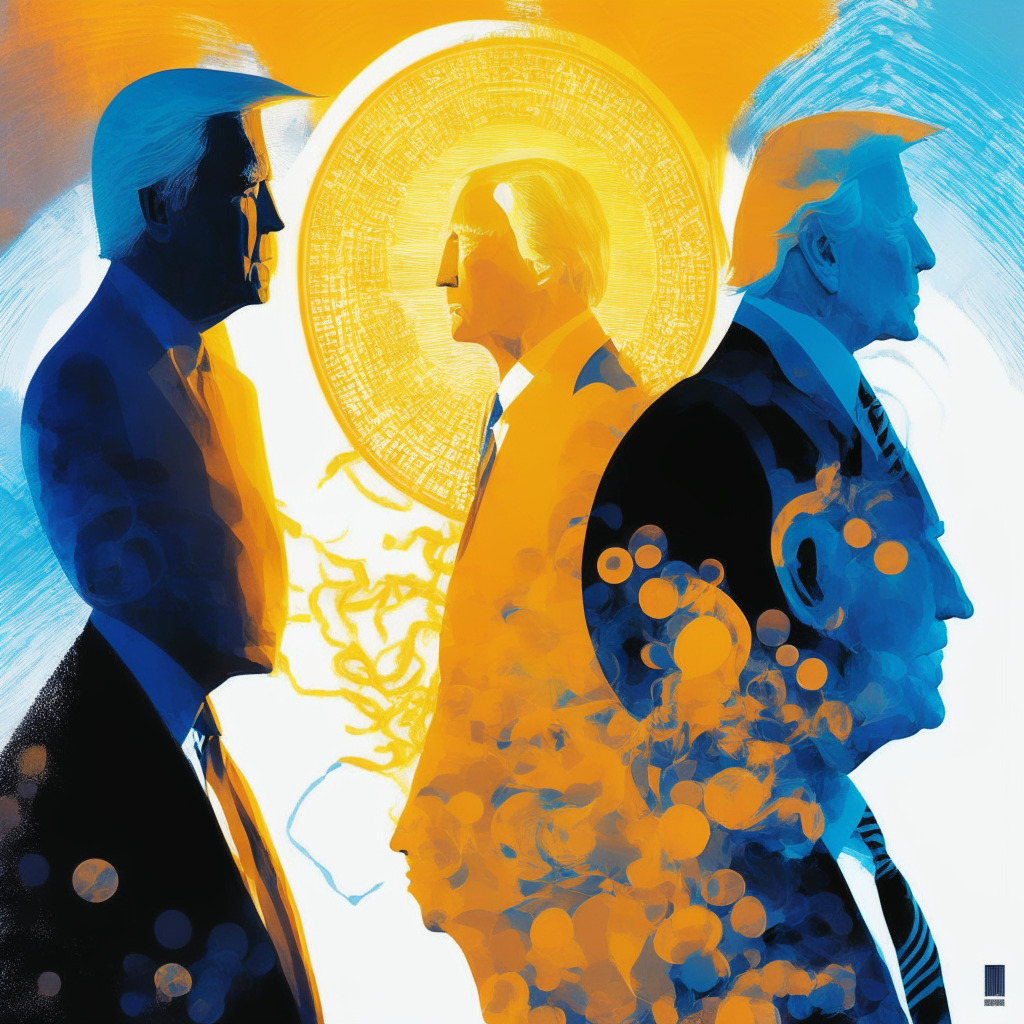“Up-and-coming US Republican presidential candidate, Vivek Ramaswamy, known for his pro-crypto stance, is accepting Bitcoin contributions for his campaign, reflecting the increasing influence of digital currencies in the financial landscape. However, his political journey faces potential setbacks due to legal issues with previous employees.”
Search Results for: Vivek Ramaswamy
Ramaswamy’s Support and Regulatory Challenges: Unraveling the Future of Cryptocurrency in the US
“U.S. Presidential candidate Vivek Ramaswamy praised Grayscale’s victory over the federal securities regulator, asserting it could further Bitcoin and blockchain innovation. However, the legal landscape for cryptocurrency regulation remains complex and uncertain, despite support from industry influencers and active discussions for clear regulations.”
Grayscale Court Victory: A Landmark for US Crypto Industry or SEC Overreach?
Republican Presidential candidate Vivek Ramaswamy perceives Grayscale Investments’ recent courtroom victory over the SEC as a critical defense for blockchain and Bitcoin innovation in the U.S. He plans to rollback federal regulations that hinder the growth of crypto markets if they don’t meet Supreme Court tests, while criticizing the contentious approach of regulation by enforcement preferred by the SEC.
Surge in Blockchain Betting Forecasts a Potential Dark Horse in 2024 Presidential Race
“Bitcoin-friendly entrepreneur Vivek Ramaswamy emerges as a formidable contender in the 2024 U.S. Republican presidential nomination. Blockchain-based betting platforms indicate his growing popularity, signifying possible cryptocurrency and blockchain acceptance in political scenarios. Though legally limited, this technology may revolutionize gauging public sentiment.”
Crypto Politics: A Game-Changer in the 2024 US Elections Pros and Cons
“Crypto is becoming a vital topic in the US electoral campaign, with notable enthusiasts Governor Ron DeSantis and Vivek Ramaswamy promoting a future centered on digital currencies. Both forecast a future where digital assets disrupt traditional finances, shaping blockchain’s future.”
Presidential Hopeful’s Take on Bitcoin: Asset, but Not Dollar Stabilizer
Republican Presidential candidate Vivek Ramaswamy, while expressing fondness for Bitcoin, would not consider it as a component to stabilize the U.S. dollar. He believes the U.S. Federal Reserve should focus on maintaining dollar stability against traditional commodities.
2024 Presidential Race: Crypto Policies Take Center Stage and Impact on Voters’ Choice
The 2024 U.S. presidential race sees candidates like Ron DeSantis, Robert F. Kennedy Jr., and Vivek Ramaswamy supporting cryptocurrencies, expressing their belief in financial freedom and innovation. However, the balance between promoting crypto and ensuring safety remains crucial, making the 2024 elections a litmus test for crypto in the U.S. political landscape.
2024 Presidential Race: Bitcoin Knowledge as a Decisive Factor in Candidate Popularity
In the 2024 U.S. presidential race, biotech entrepreneur Vivek Ramaswamy positions himself as the candidate with the deepest understanding of Bitcoin, supporting it as a decentralized alternative to the U.S dollar and planning regulatory overhauls. His cryptocurrency knowledge may attract tech-savvy voters.
Battleground CBDC: A Bipartisan Struggle Shaping Cryptocurrency’s Future in the U.S.
The House Financial Services Committee introduced three bills halting the Federal Reserve’s considerations towards a Central Bank Digital Currency (CBDC). Republicans expressed fears over the potential impact on traditional banking and the suspense it could cast on the stablecoin market. Democrats, however, pushed for continued CBDC exploration, reminding of its potential benefits in global economic competition. The Federal Reserve reaffirmed its cautious approach towards CBDC, emphasizing concerns over a stablecoin issuance without federal control.
Exploring the Political Spectrum: The Rising Influence of Bitcoin Mining and Cryptocurrencies
Senator Ted Cruz endorses Bitcoin, highlighting its potential in bolstering energy grid resilience—an advantage in emergencies, such as the recent Texas extreme weather. The stance reflects the growing influence of digital currencies, despite potential hurdles and economic turbulence.
Reshaping America’s Financial Future: The Digital Dollar Dilemma and Road to CBDC Regulation
The House Financial Services Committee is preparing to discuss the implications and regulation of a digital dollar or Central Bank Digital Currencies (CBDCs), along with private sector alternatives. This conversation, following various states erecting legislative boundaries for CBDCs and $41 million hacking of a crypto site, underlines the need for balance between innovation and robust regulatory frameworks.
Cryptocurrency in the Political Arena: Impact on the US Presidential Race
The upcoming US presidential race sees prominent “crypto candidate” Ron DeSantis in competition with other pro-crypto candidates. Amid this, the potential influence of Donald Trump’s crypto assets for 2024 raises intriguing questions for the future of cryptocurrency in the US.
The New ‘Crypto-politics’: Pros and Cons of Accepting Cryptocurrency Donations in Political Campaigns
“Florida’s Governor, Ron DeSantis, plans to announce the acceptance of crypto donations for his 2024 campaign, an interesting turn from traditional funding. However, cryptocurrency donations introduce complexity regarding traceability and potential misuse. The political landscape’s inherent unpredictability combined with cryptocurrency’s volatility invite intriguing consequences.”
The Bitcoin Market Quandary: An Era of Opportunities Amid Regulatory Tensions
“As Bitcoin’s price slips by over 4%, a significant opportunity emerges with a court ruling in favor of Grayscale. This decision could inspire a surge in cryptocurrency innovation across the United States. However, the unfolding narrative around regulatory frameworks is shaping market sentiment and raising concerns about future regulations, potentially hindering growth.”
Crypto Campaign Donations: Revolutionizing Political Funding or Publicity Stunt?
“Crypto campaign donations are gaining traction in the political arena, with key figures including Florida Governor, Ron DeSantis, considering their acceptance. Yet, concerns over their implications prompt considerations for regulations and possible contribution limitations.”
Crypto Regulation: Candidates’ Stances and Upcoming Election Implications
“Crypto regulation has become a significant issue in U.S. presidential campaigning. Candidates’ positions vary widely, from skepticism to enthusiastic adoption, yet the subject of digital assets regulation was absent from the recent Republican debate. This highlights the increasing importance of cryptocurrencies in our socio-political landscape, and suggests a need for informed legislation.”
Blockchain Based Prediction Markets: A Glimpse into the Future of Political Betting
“Blockchain-based prediction markets like Polymarket are gaining momentum as an alternative indicator for political outcomes. Despite their contested legal status, they offer unique insight into public sentiment, recording shifts in standing following events like debates. Fueled by millions in bets, these platforms may set records this election cycle, despite potential regulatory hurdles.”
SEC’s Anticipated Approval of Ether Futures ETFs: A Leap or a Stumble for Crypto?
The SEC’s expected approval of multiple Ether futures ETFs signals a significant shift in crypto regulation. However, with the potential risk posed to individual investors by crypto volatility, the outcome remains uncertain. The decision sets the stage for an exciting and transformative year for the crypto industry amidst intense discussions about the impact on the sector and investors.
2024 U.S. Presidency & Crypto: Favouring Central Bank Digital Currencies or Upholding Bitcoin?
“According to Grayscale, presidential candidates Joe Biden and Donald Trump might support the development of central bank digital currency (CBDC), despite their unclear stance on Bitcoin. Other candidates have expressed both support for cryptocurrencies and opposition to CBDCs. Amidst this, regulatory uncertainty tests the resilience of crypto firms and generates various views about the future of cryptocurrencies.”
Could Bitcoin Decide the Next President? Exploring Cryptocurrency’s Growing Political Influence
“Bitcoin and the crypto community could be deciding factors in a U.S. presidential election. Candidates now need to proclaim their stance on cryptocurrencies. The U.S. Federal Reserve estimates that 8%-11% of the American population, owning cryptocurrencies, can considerably influence the election. Anti-Bitcoin policies may thus, alienate a rapidly growing cohort of voters.”
Crypto Divide in 2024 US Presidential Election: DeSantis vs Biden on Bitcoin & CBDCs
Digital assets are becoming a significant topic in the 2024 U.S. presidential election, with Florida Gov. Ron DeSantis championing a pro-crypto stance while critics accuse the Biden administration of hindering crypto growth and advocating for CBDCs. The debate’s potential influence on the election is still uncertain.
DeSantis Champions Crypto as Civil Liberties: CBDC Skepticism Fuels Political Divide
Republican contender Ron DeSantis supports cryptocurrency as a civil liberties issue, opposing central bank digital currencies (CBDCs) and criticizing federal authorities threatened by Bitcoin. DeSantis’ anti-CBDC stance divides American politics but champions crypto as an alternative to traditional financial systems and government control.





















